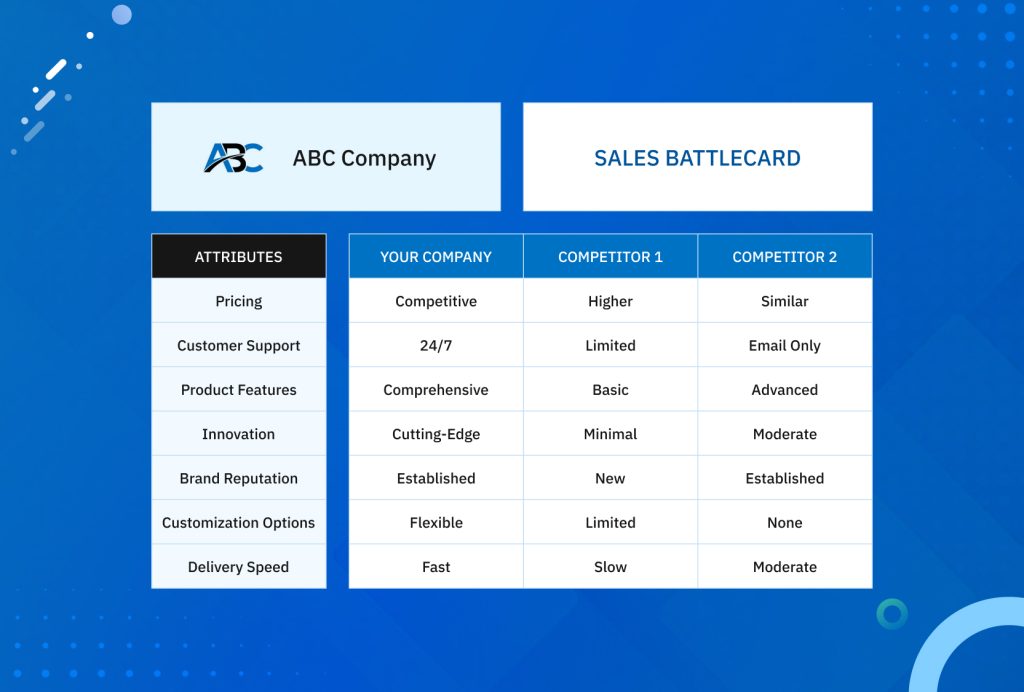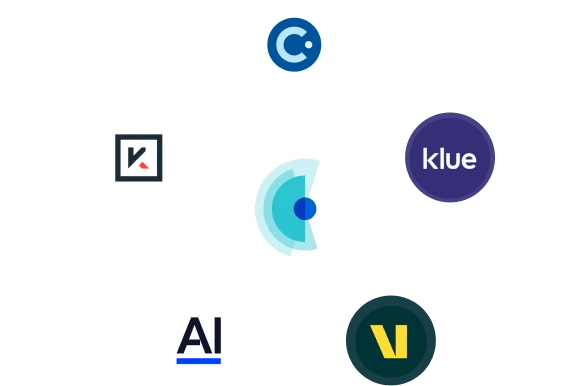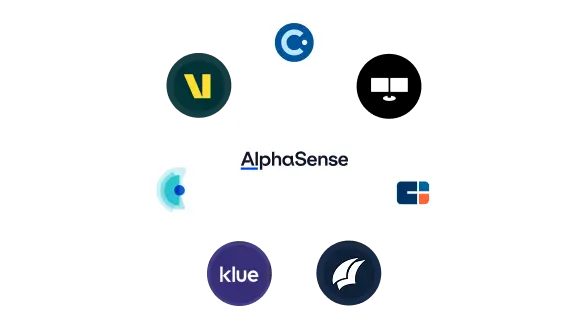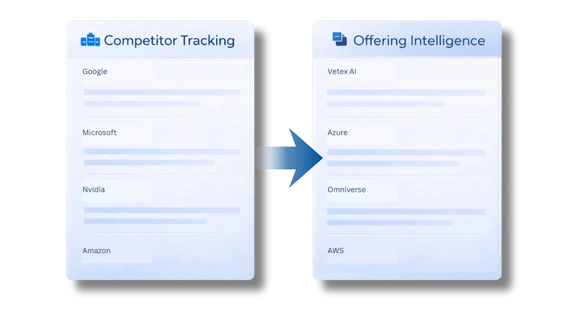Introduction
Imagine launching a new product in the market, only to realize your competitor introduced a similar one just a week earlier. Without real-time Market Intelligence (MI), organizations risk falling behind in today’s rapidly evolving market landscape.
According to one of McKinsey’s surveys, approximately 72% of companies across the world are extensively leveraging AI not just in building robust products and services, but becoming truly global. And, it’s a number that continues to grow. In this fast-shifting market, staying informed about competitors’ moves and industry trends is crucial. This is where strategic market intelligence becomes invaluable.
Through this blog, we aim to break down,
- The importance of market intelligence and its benefits.
- How it helps businesses make smart, data-driven decisions for sustainable and prolonged growth.
- Why Contify is the best market intelligence software and competitive market intelligence tool to have in one’s arsenal.
Market Intelligence: Your Strategic Compass
Market Intelligence is a systemic process of gathering, analyzing, and interpreting data about markets, industries, and competitors. When coupled with artificial intelligence (AI). AI-powered market intelligence empowers companies to effectively mitigate risks, strategically identify competitive threats, anticipate industry shifts, build robust offerings, and forward-looking strategies for competitive advantage.
It lays a much stronger foundation for organizations to leverage, achieve agility, and gain a decisive advantage. This is particularly beneficial in terms of identifying new market opportunities and acting upon them when the time is right.
Platforms like Contify empower businesses with business market intelligence to unlock growth. Here’s how:

1. Spot Emerging Trends Before They Become Mainstream
Market intelligence solutions help businesses identify shifts in consumer behavior, emerging market trends, industry behavior, and competitor strategies. For instance, early adopters of MI recognized the rise of electric vehicles (EVs) and adjusted their strategies to capture new demand before competitors.
Similarly, many giant tech startups detected the growing need for AI-powered chatbots using marketing intelligence software before the world, combined, and developed advanced solutions to solve customer problems on-the-go and gain a competitive edge.
2. Expand into New Markets
By analyzing economic indicators, competitor expansions, and regulatory changes, marketing intelligence systems help identify potential markets with strong growth potential. This approach enables businesses to expand strategically rather than competing in a saturated, existing space.
For example, insurance firms can use marketing intelligence to identify customer pain-points and develop tailored plans that align with the evolving market needs.
3. Align Product Development with Real-Time Demand
Launching a product based on outdated market intelligence research or partial data can lead to costly missteps. Here, MI ensures businesses align their product roadmap with current customer needs and competitor strategies, leading to higher success rate at launch.
A Fintech company, for example, can track competitor innovations and refine its offerings to improve customer retention as well as drive new business conversions.
4. Strengthen Competitive Positioning
With a 360-degree view of the market, organizations can benchmark performance, refine their go-to-market strategies, and seize more sales opportunities. A semiconductor manufacturer used strategic market intelligence increased its sales pipeline by 25% and reduced customer churn by 50% by identifying cross-selling and upselling opportunities.
To maximize the benefits of market intelligence, businesses must monitor both quantitative KPIs (e.g., revenue, sales) and qualitative KPIs (e.g., customer feedback, survey results). AI-driven analytics further accelerate insights, and can help companies make informed, timely decisions.
Market Intelligence Vs. Market Research
Many confuse market intelligence with market research and often use the two terms interchangeably. While they may appear similar, they serve different purposes.
To give you an example, market research is a one-time snapshot that helps you gather data on consumer preferences or financial trends at a single point in time. However, market intelligence is an ongoing process that provides awareness from all possible spectrums. It continuously monitors preferences of customers and shares information that influences a company’s long-term business strategy.
The table below highlights key differences between market intelligence and market research.
| Basis of Differentiation | Market Intelligence | Market Research |
| Objective | Evaluates the feasibility of a new product or service through research conducted directly with consumers. | Assesses the overall functioning of a business by maintaining continuous awareness of the target market. |
| Focus | Focuses on company-specific factors. | Focuses on market-specific factors. |
| Scope | Includes consumer preferences, customer perception, customer base, retention, trends, and product features. | Encompasses market share, industry investments, competitor strategies, market trends, and customer spending. |
| Strategic role | Provides insights for specific product or service development decisions. | Offers a comprehensive perspective to shape broader business strategies and market positioning. |
This comparison also mirrors the relationship between marketing intelligence vs marketing research, where the former is more dynamic and continuous in nature.
How Different Functions Are Using Market Intelligence
What is marketing intelligence if not a tool that empowers teams across functions? Today, marketing intelligence trends show a growing emphasis on personalization, real-time data, and integrated decision-making.
According to a 2023 survey by Gartner, 70% of organizations have a MI initiative in place, compared to just 30% in 2018. Contify, an AI-powered market and competitive intelligence (M&CI) platform, offers the best market intelligence across the globe.
At present, it’s leveraged by 100+ global organizations across diverse industries to not only gather the right insights at the right time, but use them to stay ahead.
Here are examples of how different teams benefit from types of market intelligence:
Marketing Team: Getting A Holistic View
With marketing intelligence, businesses can analyze all aspects of a market. This data, sourced via business market intelligence tools, helps tailor customer engagement strategies, enabling organizations to gain a deeper understanding of their markets by gathering data in near real-time. For instance, marketers can track individual competitor campaigns and messaging to understand strategies that work well.
According to Hubspot, 96% of buyers research before talking to sales. With a marketing intelligence system, marketers can align messaging to match customer expectations and behavior.
Sales Teams: Boosting Wins
Without MI, there are often gaps in how and where businesses can market their products. For instance, a company manufacturing semiconductors was on the lookout for new sales opportunities but struggled with performing comprehensive research on its own.
One market intelligence example is a semiconductor firm that leveraged Contify to increase its sales pipeline by 25%. It used competitive market intelligence to identify upsell/cross-sell opportunities, a vital use case of marketing intelligence software.
Sales battlecards, created using market intelligence research, also help reps position better during pitches.

Battlecards provide concise intel that helps you understand your positioning as compared to your competitors. This is great for identifying gaps and performing market segmentation effectively.
Strategy Team: Gaining Competitive Advantage
What is marketing intelligence good for at a strategic level? Monitoring competitor website updates, integrations, and patent filings provides valuable insights into their product roadmaps and strategic direction. Analyzing competitor product demos can also reveal new features or capabilities that may be overlooked.
Using tools like market intelligence platforms like Contify, they can track new launches and sources of market intelligence in real-time to plan ahead.
Product Marketing: Making The Difference
With marketing intelligence, product teams can benchmark features and assess market gaps. For example, Ford responded to Tesla’s EV push by tracking demand signals and aligning its roadmap accordingly, a classic case of strategic market intelligence at work.
Further, you can differentiate your offerings from others in the same space. For instance, Ford has been a well-known name in the automobile industry for over a hundred years. Ford decided to follow suit when another player Tesla was taking up a lot of space with their electric vehicles (EV).
They did this by identifying product development opportunities amidst increasing demand for EVs.
Conclusion
Market intelligence definition goes beyond just data, it’s about deriving real meaning from ever-changing market signals. In today’s competitive landscape, businesses can’t afford to ignore the value of continuous market intelligence monitoring.
While implementing it requires investment, the benefits of market intelligence, from faster go-to-market execution to deeper customer understanding outweigh the costs. And with Contify, the transition becomes seamless.
Ready to power your business with real-time insights?
Explore Contify’s AI-driven platform, the best market intelligence software for modern businesses.
Sign up for a free 7-day trial.
FAQ’s
How is market intelligence different from marketing intelligence?
Though they often overlap, market intelligence typically focuses on external factors like competitors, industry shifts, and regulatory changes. Marketing intelligence, a subset of market intelligence, is more focused on customer behavior, campaign performance, and buyer journeys. Together, they form a holistic view that supports smarter business and marketing decisions.
What are the sources of market intelligence data?
Sources of market intelligence include news articles, regulatory filings, social media, analyst reports, financial disclosures, customer reviews, surveys, and competitor websites. Platforms like Contify aggregate and analyze these sources to deliver timely, relevant insights.
Why is market intelligence important for strategic decision-making?
Strategic market intelligence enables organizations to anticipate threats, uncover new opportunities, and shape long-term strategy. It ensures businesses are not reacting to change, but leading it with the right information at the right time.
What are the best market intelligence & research tools?
The best market intelligence and research tools depend on your goal: for enterprise-grade competitive and market monitoring, platforms like Contify, Crayon, and Klue centralize competitor tracking and strategic signals; for digital and web market analysis, Similarweb, SEMrush, and Ahrefs provide traffic, keyword, and benchmarking insights; for B2B data and segmentation, ZoomInfo and LinkedIn Sales Navigator are widely used; while for consumer trends and research depth, Brandwatch, BuzzSumo, and Statista help uncover sentiment, engagement, and industry data.
Can you explain the difference between market intelligence and competitive intelligence tools?
Market Intelligence (MI) tools help organizations understand the broader market environment. They track industry trends, regulatory developments, shifts in customer behavior, macroeconomic signals, emerging technologies, and new entrants. The goal is to answer strategic questions like: Where is the market heading? Which segments are growing? What external forces could impact demand?
These tools are commonly used by strategy, corporate development, and product leadership teams.
Competitive Intelligence (CI) tools, on the other hand, focus specifically on monitoring direct competitors. They track product launches, pricing changes, messaging updates, hiring activity, partnerships, and other competitive moves. The goal is to help teams answer tactical questions such as: How is Competitor X positioning itself? What changed in their offering? How should sales respond?
CI tools are primarily used by product marketing, sales enablement, and competitive strategy teams.
In short, Market Intelligence looks outward at the entire market, while Competitive Intelligence focuses on specific competitors. Leading platforms in 2026 combine both to deliver comprehensive Market & Competitive Intelligence (M&CI).



